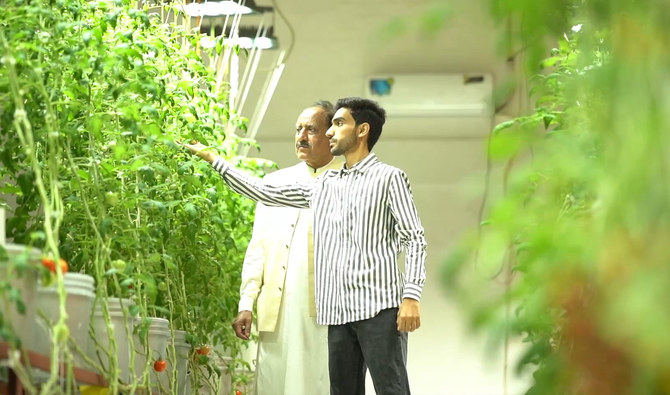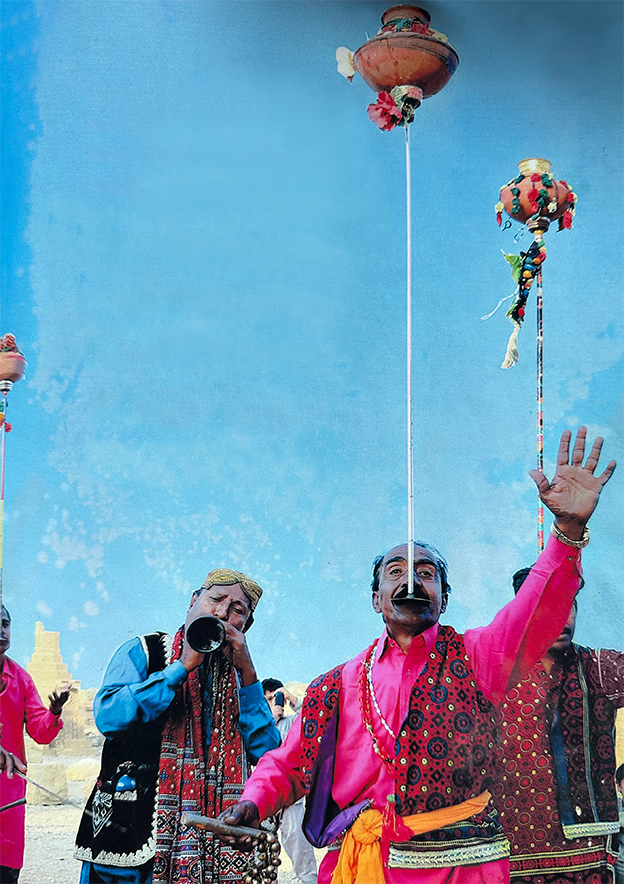HYDERABAD, PAKISTAN: In a large storehouse in the southern Pakistani city of Hyderabad, a 29-year-old entrepreneur is growing tomatoes on a hydroponic farm, defying land degradation, water shortage and power cuts in a country that ranks among the top 10 nations worldwide most affected by climate change.
Attiq-ur-Rehman Bhayo says his solar-powered set-up, in which farming is done in water instead of soil, will provide an urban solution to Pakistan’s agriculture needs as it faces more extreme rainfall, drought and heat waves, crop losses and other worsening threats from climate change.
Instead of soil to grow the tomatoes, Bhayo uses a water-based nutrient solution, coco peat, which is crushed from coconut husks, comes in the form of fine dust or powder and is popular due to its environmental friendliness and sustainability. In hydroponic farming, water is conserved because it is reused multiple times. Hydroponically grown plants also require no pesticides because there are no soil-borne diseases.
Spread over a large 4,000 square feet storehouse, Bhayo’s farm has been registered with the Securities & Exchange Commission of Pakistan (SECP) since April 2022 and yielded its first produce in January this year. Since its inception, the farm has produced around 100 kilograms of tomatoes and exotic cherry tomato varieties.
Bhayo said his farm is the first solar-powered vertical farm in Pakistan, though there is no official confirmation of this.
“This is controlled environment agriculture based on hydroponic technology. In this system plant roots are submerged in a nutrient-drenched water solution,” Bhayo, the chief executive officer (CEO) and owner of Sulit Agro (Pvt) Ltd, told Arab News.
“Basically, the main difference between this system and the traditional system is yield and the quality of the fruit. As you can see this is a controlled environment so we don’t use any pesticides or fungicides which give us organic produce.”
Bhayo, who comes from a traditional family of farmers in Pakistan’s Sindh province, decided to pursue hydroponic farming while pursuing a Masters of Science degree in Engineering Business Management in the United Kingdom.
On returning to Pakistan in 2018, he set up his farm under the Prime Minister’s Kamyab Jawan Youth Entrepreneurship Scheme at a cost of Rs20 million.
“URBAN FARMING”
Hydroponic farming offers many benefits, including minimal food wastage as compared to open field cultivation, the prevention of nutrient runoff pollution that endangers livestock, fertilizer conservation, savings in pesticides, herbicides and fungicides, water conservation through closed-loop systems to avoid aquifer depletion, elimination of tilling to save Co2 emissions and protect soil microbes, and high yield in small spaces, Bhayo explained.
But the primary distinction between hydroponics and traditional farming was yield and fruit quality, the grower said.
Under the controlled environment of a hydroponic farm, pesticides and fungicides were unnecessary, resulting in organic produce. Additionally, produce could be available year-round compared with soil-based farming, which typically yields tomatoes for only three or four months annually.
Also, with traditional farming, the average yield per plant is 5 to 8 kilograms per season each year, whereas with hydroponics, the yield is year-round with an average of 36 kilograms per plant. If more advanced hydroponic systems are used in a high-tech temperature-controlled environment with special lights, the yield can go up to to 60 kilograms per plant yearly.
It is for these reasons that vertical farming is gaining momentum in Pakistan, primarily driven by the private sector, with public sector organizations also embracing the modern agricultural approach.
The Soil Salinity and Reclamation Research Institute (SS&RRI), a provincial body established in Sindh’s Tando Jam town, recently carried out experiments using hydroponics.
“Under the hydroponic system, we experimented with five vegetables, brinjal, chilies, tomatoes and others,” an official at the institute, Jamila Jamro, told Arab News.
In soil-less farming, she said, plants received essential elements without toxic additions like arsenic and cadmium, making the fruits healthier than those that came from field crops.
“We recommend indoor farming over traditional field farming,” Jamro said.
She said the institute’s future plan was to expand its research to major crops such as rice and wheat, for which it would identify salt-tolerant varieties.
“FUTURE SOLUTION”
According to the United Nations Food and Agriculture Organization (FAO), the world’s population is expected to reach 9.7 billion by 2050, 70 percent of which will be living in urban areas mainly in low- and middle-income countries in Africa and Asia.
Against this background, the FAO has been supporting the transformation of urban and peri-urban agriculture (UPA) into a recognized urban land use and economic activity, integrated into national and local agricultural development strategies as well as food and nutrition programs and urban planning, a Sindh-based FOA official, James Robert Okoth, explained.
He told Arab News the social shift toward urbanization in Pakistan, combined with climate change which was reducing available farmland, had spotlighted the importance of urban farming to enhance food security and availability in communities.
“Urban farming is important for Pakistan, especially in Sindh province, as the effects of climate change are becoming increasingly evident,” Okoth said. “There is considerable land degradation, and much of the groundwater is becoming brackish, limiting crop options in these areas.”
Urban farming allows for intensification within a small area, enabling the cultivation of diverse, nutritious vegetables, as well as creating employment opportunities, the FOA official added.
Bhayo agrees and hopes the idea will catch on.
After having successfully established his farm, the entrepreneur now offers consultancy on greenhouse technology to others intending to set up similar farms.
“The response is that people are most likely scared whether they will get a return from this huge investment or not,” he said, adding that government support to scale hydroponic farms, through loans and knowledge transfer, was the way forward.
“This will provide them [farmers] a good opportunity to invest in this system,” Bhayo said. “Once you stabilize the system, there are minimum requirements to maintain the system.”




















